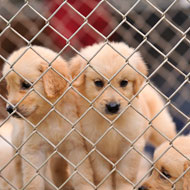
Undercover investigation reveals shocking truth behind illegal puppy smuggling
Shocking new footage has exposed widespread abuse of the Pet Travel Scheme (PETS). Lithuanian and Hungarian criminal breeders, vets and transporters have been caught on camera colluding in the illegal puppy trade, which poses a very real threat to the UK.
Footage taken during a six-month undercover investigation by the Dogs Trust shows European vets forging pet passports and rabies vaccination records. Underage puppies were also found to slip through the net undeclared. Smuggling is being made simpler due to a lack of checks at borders and ferry ports.
Criminal breeders are said to make in excess of £100,000 a year. The Dogs Trust warns that the trade is "spiralling out of control with no deterrent".
With Christmas looming, it is feared the UK will see a surge in the number of puppies imported from Eastern Europe.
Paula Boyden, the charity's veterinary director, said: "Unsuspecting British shoppers will continue to buy puppies online which may have been brought into the country illegally; meaning the risk of unknowingly bringing a puppy from Eastern Europe with diseases and behavioural problems into the home is very real."
Such puppies suffer every day as a result of the trade, often travelling over a thousand miles in appalling conditions, without the necessary treatments or vaccinations. With this comes a very real risk of serious disease to UK dogs and owners.
Since the pet travel rules were loosened two years ago, there has been significant concern about the risk of disease being imported into the UK.
BVA president John Blackwell said the Dogs Trust report "highlights the serious concerns that BVA has raised with Defra over the level of controls and checks at our borders".
Between 2011 and 2013, the number of declared puppies entering the country from Lithuania rose by 780 per cent, and from Hungary, 663 per cent. However, the Dogs Trust warns that these figures do not even scratch the surface due to the high number of puppies being imported illegally. The charity is urging new buyers to think "Where on earth is my dog coming from?"
The charity says it has seen illegally smuggled dogs abandoned because their owners could not or would not pay the additional veterinary fees and quarantine costs their new pet required when they discovered it had been imported illegally. It says animal welfare charities and local authorities are left "to pick up the pieces".
The damning results of the charity's investigation have been submitted to Defra, along with urgent calls for change.
A spokesperson from P&O Ferries said they are concerned the Pet Travel Scheme is being abused, due to the high number of young dogs that are presented for travel.
"Dogs Trust has our support for its proposals to raise the age of dogs allowed to travel into the UK, backed by tougher penalties against those engaged in the illegal importation of puppies," the spokesperson added.
Defra has said it will be speaking to Lithuanian and Hungarian authorities about the report's findings.
Visit the Dogs Trust website for the full report.



 The latest
The latest